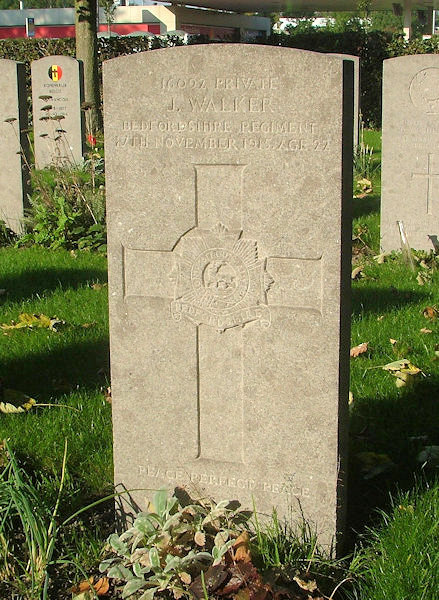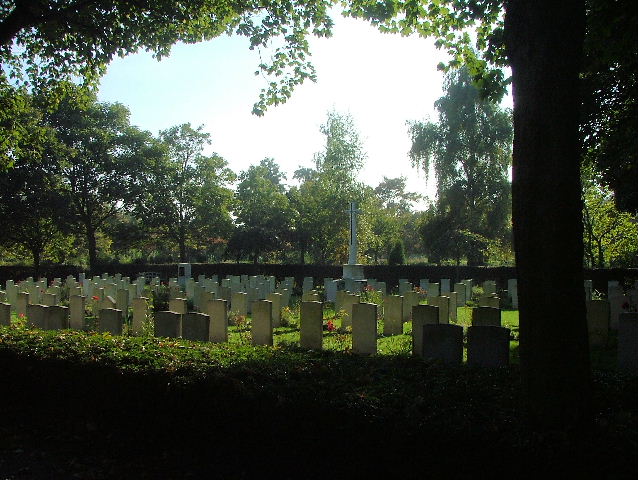Name
Joseph Walker
Conflict
First World War
Date of Death / Age
17/11/1915
22
Rank, Service Number & Service Details
Private
16092
Bedfordshire Regiment
8th Bn.
Awards: Service Medals/Honour Awards
1914 /15 Star, British War and Victory medals
Cemetery/Memorial: Name/Reference/Country
FLUSHING (VLISSINGEN) NORTHERN CEMETERY
I. 9.
Netherlands
Headstone Inscription
Not Researched
UK & Other Memorials
Great Offley Village Memorial, St Mary Magdalene's Church Memorial, Great Offley, Pirton School Memorial. Addenda to the Pirton Village Memorial
Biography
As with Fred Thompson, Lynda Smith provided the initial information and again, once identified, more information quickly came to light. The School Memorial lists him, confirming that he attended Pirton School, but he is incorrectly shown as surviving.
Joseph was the son of Stephen and Emma Walker (née Weeden) and he was born in Pirton on December 11th 1890. Parish and census records show the family to be Charles (b 1880), Albert (b 1882), Frederick (bapt 1884), Ellen (b 1887) and Joseph (b 1890). The census of 1881, 1891 and 1901 confirm that the family was living in Pirton during this period and all, parents and children alike, were born in Pirton. Stephen earned his living from agriculture and then, later, non-domestic gardening. Emma earned extra money for the family by straw plaiting - a common source of income in the village. Interestingly Albert and Frederick’s connection to Pirton seems to be confirmed by their inclusion on the lists of Pirton men serving in the Parish Magazine, but Joseph appears to have been missed.
Sometime after 1901, but before the war, at least some of the family including both parents and Joseph moved to Offley and lived in one of the Claypit Cottages. By 1914 Joseph was working for a farmer called Mr Miller, presumably in or around Offley. Whether he was living in Pirton is not known, but he was certainly visiting Pirton and was active in village life, as the Hitchin Express of July 11th mentions him as a steward at the Pirton Transept Fete. Apart from this and the fact that he was single, little else is known of his life before the war, but in early September 1914, just over a month after war was declared, he went to Hitchin and joined up for the duration. He became Private 16092 of the 8th Battalion, Bedfordshire Regiment. As mentioned, his brothers Albert and Frederick also served, but they survived.
Joseph’s death is recorded as November 17th 1915. He did not die as a result of injuries received on that date, but died as a consequence of the conditions in which he had been fighting.
His Regiment was formed in October 1914 and they spent a lot of time training, mostly in Bedford, but with additional training in Surrey. They were finally mobilised to fight at 11pm on August 28th 1915 and by September were fighting in France in the Battle of Loos. By the end of September conditions were awful and then got worse and wetter as the year progressed. In November the Regimental War diary makes references to the conditions; ‘Wet weather. Pumping and draining trenches, many trenches falling in. Garden Street (a trench) full of water.’ ‘Trenches very muddy and in bad condition.’ ‘Trenches very full of water it rained heavily during the day’. Joseph had written home on November 7th ‘I am going in the trenches again tonight (Sunday) for six days, and then we are starting our holidays when we come out.’ So he was expecting leave and he added that he was looking forward to his visit home.
In excessively wet conditions men could suffer from an infection known as trench foot - a very painful condition. This could turn gangrenous and, if so, amputations were necessary. This seems to have been the case for poor Joseph as Luton papers reported that he had lost both legs though trench foot. He must have suffered terribly, but was considered strong enough to be returned to England, but to what future? On November 17th 1915 he joined 390 injured officers and soldiers, together with doctors, nurses and crew of 56 on the hospital ship the HMHS Anglia and headed back to England. Unfortunately they could not know that the German submarine UC-5 had been laying mines in the English Channel and at 12:30pm, just one mile east of Folkestone Gate they struck one. Within fifteen minutes the ship had sunk and despite another ship racing to her aid, the estimated loss of life was between 120 and 164 including 25 crew and sadly, Joseph Walker. As a ‘cot case’, one of two hundred on board, he would have stood little chance of survival.
The news of his death came as a terrible shock to his parents and the Hertfordshire Express of December 4th 1915 reported that they had not been aware that he was incapacitated and was on his way to England. In fact they were under the impression that he was with his Battalion in the trenches. The same report refers to Joseph as ‘the first old boy of Pirton School to lose his life in the present war.’ The Dover local paper, incorrectly, reported that the ship had been sunk by a torpedo.
Captain Manning, who was in command of the ship, had no doubts that it was a deliberate act to target the hospital ships. The mines had been laid near one of the buoys placed on the route for the hospital ships. These ships were clearly marked and no other ships were allowed to follow their route.
Interestingly the German submarine UC-5 later came to grief after she became stranded on a sandbank and was captured by the Royal Navy. She was later put on display at Temple Pier on the Thames and then transported to the U.S.A. to be displayed.
Joseph’s life ended on that day and he was within a mile of being buried in England, but sadly his body was washed out to sea and was not recovered until January 11th 1916, when, complete with his ‘dog tags’, he was washed up on the beach at West Capelle, in the Netherlands. Unsurprisingly, after two months in the water, the paper reported that his burial was to take place immediately. His burial and the associated ceremony caused quite a stir and were reported in the Amsterdam papers and the war time magazine, Land and Water. The reports were accompanied by the drawing, which is reproduced here, by the distinguished war artist Louis Raemaeker.
For his funeral his white wooden coffin rested on a bier in the church. The service was undertaken by an English clergyman, the Rev. Mr Fraser and the Vice-Consul from Flushing attended the service. He laid the Union Flag over the coffin, which was then carried to the grave by four local men. The following words were read:
‘Who is Walker, No. 16092, Pte. Joseph Walker Bedfordshire Regiment? Who in loving thoughts, thinks of him with hope even now when we strangers to them, stand near to him in death? Where is home? We know not, but in our inmost hearts we pray for a message of comfort and consolation for his people.’
Some time after the war his body was exhumed and laid to permanent rest in one of the Commonwealth War Graves of the town cemetery, Flushing (Vlissingen). Ref. I. 9. Northern Cemetery. He is also commemorated on the Offley memorial.
Additional Information
Text from the book: The Pride of Pirton. It is also sad to know that despite the war dead here and a campaign, the wreck of this Hospital ship was not declared a war grave site.
Acknowledgments
The Pride of Pirton book – www.pirton.org.uk/prideofpirton Chris Ryan / Tony French / Jonty Wild



